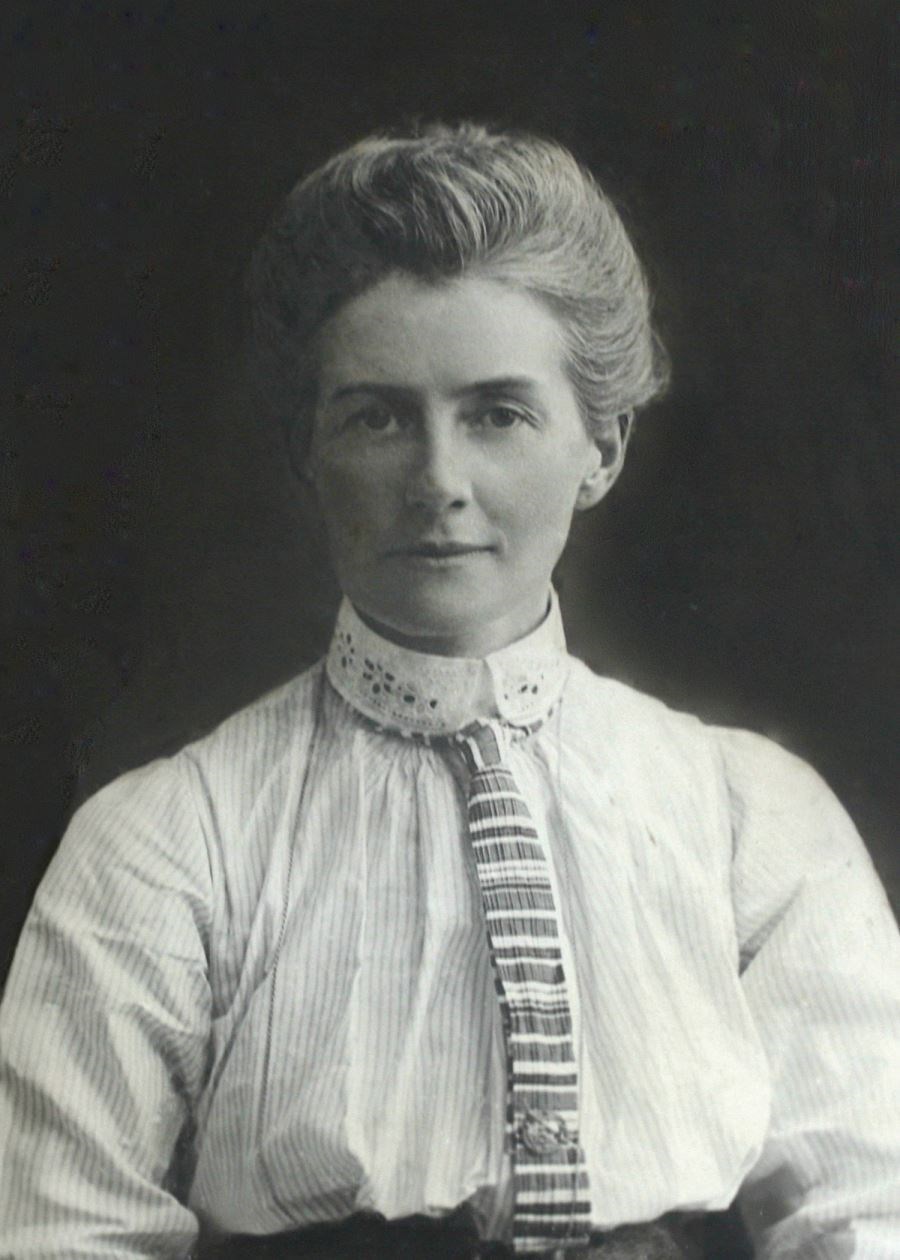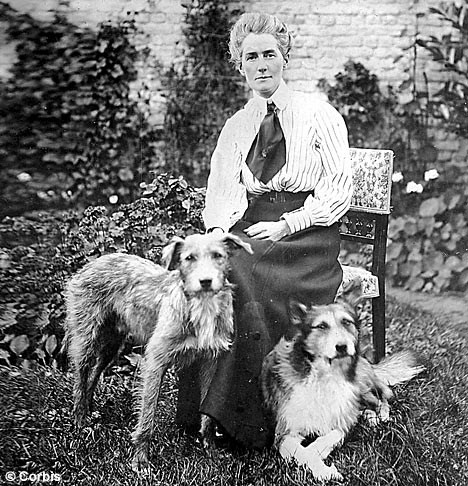 Edith CavellThe original uploader was Vivedatica at Dutch Wikipedia. [Public domain]Before World War I, and to this day, the stereotype for women has been that they are delicate creatures who must remain mothers and housewives. The war was an opportunity for women to break that stereotype. Edith Cavell became involved with medical practices, which helped her save the lives of the soldiers during war. Edith Cavell was born December 4, 1865. She grew up in a religious household with her father who was a priest. His religious values heavily influenced Cavell into becoming the hero she is known for being today. A hero must possess selflessness and bravery. To be selfless is to have greater concern for others than for oneself. To be brave is to not fear danger. Edith Cavell is a hero because she acquires both bravery and selflessness.
Edith CavellThe original uploader was Vivedatica at Dutch Wikipedia. [Public domain]Before World War I, and to this day, the stereotype for women has been that they are delicate creatures who must remain mothers and housewives. The war was an opportunity for women to break that stereotype. Edith Cavell became involved with medical practices, which helped her save the lives of the soldiers during war. Edith Cavell was born December 4, 1865. She grew up in a religious household with her father who was a priest. His religious values heavily influenced Cavell into becoming the hero she is known for being today. A hero must possess selflessness and bravery. To be selfless is to have greater concern for others than for oneself. To be brave is to not fear danger. Edith Cavell is a hero because she acquires both bravery and selflessness.
Edith Cavell is a selfless hero because she was more concerned about the health and safety of others than her own. During World War I, Edith Cavell was a controversial hero. To some she was seen as a woman who saved lives, to others she was seen a person who aided the enemy. "Miss Cavell decided to aid the British servicemen, hiding them in the hospital and safe houses around Belgium" ["Cavell, Edith (Louisa)], despite the fact that it was illegal. Many people would have thought that this was bad because she was aiding the enemy, but Edith didn't see it that way. She was raised to help others and be nice to everyone. The reason she helped both sides during war was because she felt it was her moral duty as a nurse and a Christian to help anyone who needed it and leave no one to suffer. During the war, Germans had warnings and propaganda that threatened anyone who tried to aid opposing countries. "The occupying German army threatened strict punishments for anyone who was found to be 'aiding and abetting the enemy'" (Pettinger, Tejvan). Despite being told that her actions were illegal and could result in her death if she got caught, she was still determined to help people. She was more concerned about the health and safety of others than herself. Her actions proved that she was a hero.
Edith Cavell was a brave hero because she risked her life for others. Being a woman was difficult enough during the 1800s, so becoming a known hero was even harder. "Edith took the risk of nursing and hiding them and subsequently to help them escape toward the Netherlands. Thus she became a resistance worker, involved in a network assisting the escape of Allied soldiers" ("Edith Cavell." Europe). Edith was breaking the law and risking her life to help people. Not many others were brave enough to do that, but she was. Many Germans would have disagreed with her actions and thought she was doing more harm than good. But Edith knew that she was doing the right thing. Edith wasn't just disobeying orders from the Germans, but she ignored other nurses in order to remain a nurse during war. "When the many English nurses living in Brussels were ordered to return to Britain, Cavell ignored the order and kept working" ("Edith Cavell." Europe). Every time she disobeyed commands, it was for the best. If she and the few other nurses had decided to leave, they would not have been able to save the lives of the soldiers. Not many people were brave enough to break rules and risk their own lives, but Edith Cavell was one of the few people who were. Word eventually got out and the Germans found out about Edith secretly aiding soldiers from both sides. Edith was "arrested on August 5, 1915 by the Germans and incarcerated at Saint Gilles prison" ("Edith Cavell." Europe). After her arrest, she still remained a highly respected woman, and the majority of people recognized her as a hero rather than an enemy.
 Edith CavellUnknown author / Public domainWomen were seen as people who couldn't accomplish much, yet Edith proved them wrong. Despite her controversial decisions during war, she is still considered a hero because of her selfless acts of bravery. She risked her life by hiding from the government and helped house and aid wounded soldiers from both sides during World War I.
Edith CavellUnknown author / Public domainWomen were seen as people who couldn't accomplish much, yet Edith proved them wrong. Despite her controversial decisions during war, she is still considered a hero because of her selfless acts of bravery. She risked her life by hiding from the government and helped house and aid wounded soldiers from both sides during World War I.
Edith Cavell is not only an inspiration to me, but "the execution of a woman, and moreover of a nurse, raised a wave of indignation throughout the world. Edith Cavell became the symbol of innocence at grips with German barbarity, an image that came to be gratefully exploited by the Allied propaganda" ("British nurse Edith Cavell). Edith inspired many people throughout the world. At the time of war, she became a symbol against Germany. Edith is an inspiration to me, because I respect her for what she did and why she did it. Before Edith's execution, she said this: "They have all been very kind to me here. But this I would say, standing as I do in view of God and eternity: I realize that patriotism is not enough. I must have no hatred or bitterness towards anyone" (Pettinger, Tejvan). What she meant by this was that love and devotion for one's country will not make the war end, only love and devotion for others can bring peace. She didn't help people in order to support a side; she helped them because it was the moral thing to do. She was so devoted to helping people that she risked her own life to do so. Many people disagreed with her actions because they felt as if she was supporting the enemy, but she just wanted to help people. Not even her own death could ruin this woman's positive outlook towards life.
Works Cited
"British nurse Edith Cavell executed ." 2015. The History Channel website. Jan 28 2015, 5:48
http://www.history.com/this-day-in-history/british-nurse-edith-cavell-executed
"Cavell, Edith (Louisa)." Britannica Biographies (2012): 1. Biography Reference Center. Web. 28 Jan. 2015.
"Edith Cavell." Columbia Electronic Encyclopedia, 6Th Edition (2013): 1. Literary Reference Center. Web. 28 Jan. 2015.
"Edith Cavell." Europe Since 1914: Encyclopedia of the Age of War and Reconstruction. Ed. John
Merriman and Jay Winter. Detroit: Charles Scribner's Sons, 2007. Biography in Context. Web. 30 Jan. 2015.
Pettinger, Tejvan. "Biography of Edith Cavell", Oxford, www.biographyonline.net, 30th Nov. 2010
Page created on 2/13/2015 12:00:00 AM
Last edited 4/3/2020 3:36:03 AM
